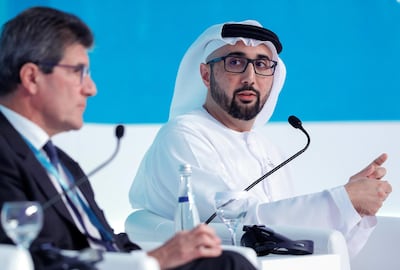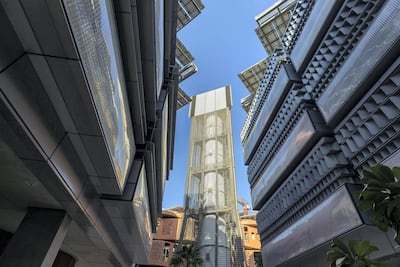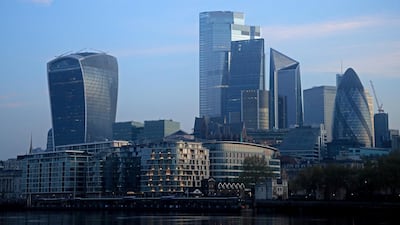The UK’s infrastructure sector remains an attractive market for strategic UAE-based investors seeking long-term returns from a developed market, a panel of leading businesses heard on Thursday.
Among those discussing UK prospects was a representative of Mubadala Investment Company, which is committed to new deals in the country despite the challenges of the pandemic.
Saed Arar, executive director of traditional infrastructure at Mubadala, said the organisation’s London office ensures the organisation can “get to deals as quickly and as efficiently as possible” because the UK remains a global economic hub that is home to a number of its investments.
“The UK remains an attractive market for us and we continue to look at infrastructure deals across” traditional infrastructure, real estate and renewables, Mr Arar told a virtual session on Thursday, hosted by the thought leadership forum, the UAE-UK business council.
Former banker Mr Arar, who joined Mubadala in 2006, pointed to a recent investment in British smart metering firm Calisen as an example of Mubadala’s commitment to the UK.
“The UK is a global economic hub. Over and above it is home to a number of our investments, from a traditional infrastructure perspective, from a real estate perspective and from a renewables perspective," Mr Arar said.
Infrastructure forms part of Mubadala's new organisational structure, which now focuses on four lines of business for its next phase of growth.
The strategic investment fund, which has $232 billion of assets across six continents, is now organised around UAE investments, disruptive investments, direct investments and real estate and infrastructure.
Mr Arar said infrastructure has remained one of its more resilient investments amid the coronavirus pandemic, with the real estate and infrastructure platform deploying capital into physical assets around the world “that offer long-term stable returns across different business cycles”.
“Look at us as the stabiliser of Mubadala’s portfolio,” he said. “Despite the challenges in 2020 due to the pandemic, we saw the benefits of the infrastructure segment further emerge as a safe haven to some extent to investors like us.
“We look at other investments that provide us with resilience, especially in the downturn of economies, and we look at making sure that cash yields and stabilised returns are always there,” he said.

Tariq bin Hendi, director general of Abu Dhabi Investment Office – a government body that oversees Abu Dhabi’s public-private partnerships (PPP) for infrastructure development and a platform that promotes investments into the emirate – said the region has invested in the UK for a long time.
It will continue to do, he said, “because it is an attractive market and in the long term the UK does have to rebuild some parts of its infrastructure”.
In terms of the UK’s participation in UAE infrastructure, and in Abu Dhabi specifically, he said the focus is now on attracting British businesses and investors into the entire PPP process.
“That means that they come in, they actually run the due diligence with us, they understand what that project needs to look like. They bring in the expertise that they've gained in the UK or in another market,” he said.
“The exchange of information and learning based on our respective government initiatives in this space, around both the hard asset and the environmental component of that, is going to be absolutely key to being able to generate the right types of attention from investors. [It will also] bring in the right types of partners and make sure that you are delivering on infrastructure that is long lasting.”
Mr Arar and Mr bin Hendi both said that environmental, social and governance (ESG) standards are now at the heart of UAE's investment strategies.
Mr Arar said ESG and clean infrastructure are part of the group’s remit going forward as ESG awareness continues to grow around the world.
“Mubadala is a responsible investor,” he said. “We team up with like-minded investors, especially ones that are very much strong advocates of sustainability … and the green movement.”
From this year, the group will assess and measure the ESG performance, risks and opportunities of any investment and asset management process, Mr Arar said.
“Clean infrastructure continues to be and has been for some time, our top priority,” he said.

He pointed to the creation of Masdar in 2006, which has since invested in sustainable and renewable energy in 30 countries.
“Even our production lines, in aluminium, for example, under EGA (Emirates Global Aluminium) is currently using solar panels, so it just shows you that even the industrial segment of any economy can benefit or play an effective role in in further enhancing sustainability and green energy,” he said.
Mr bin Hendi said both the UK and UAE are contributing towards addressing infrastructure needs in a "forward-looking environmentally friendly manner".
"Financial investors, as well as operators and constructors in these segments, should take heed that this is not something that is temporary," he said.
"If infrastructure projects do not adopt ESG as a policy, it will be much more challenging to convince the masses to invest … and to participate than it would otherwise."


